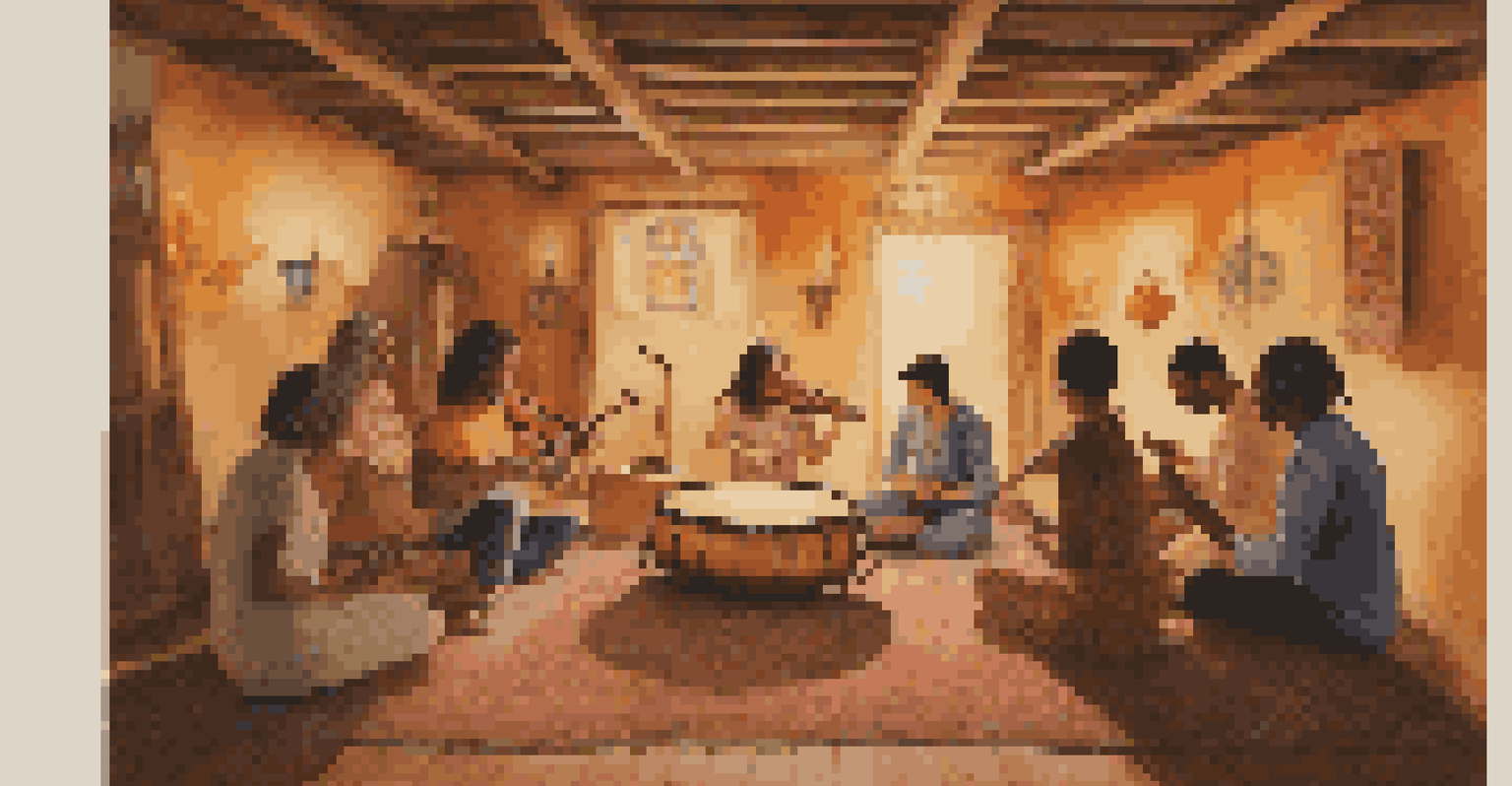The Interplay Between Music, Emotion, and Spirituality

Understanding the Emotional Power of Music
Music has an uncanny ability to evoke emotions, often leading us to feel joy, sadness, or nostalgia. This emotional response is universal; think about how a familiar song can transport you back to a moment in time. The intricate melodies and harmonies resonate with our feelings, creating a powerful connection between sound and emotion.
Music can change the world because it can change people.
Research suggests that music activates the brain's reward center, much like food or social interactions do. This means that when we listen to a beloved song, our brain releases dopamine, the 'feel-good' neurotransmitter. This biological response can explain why certain tunes can lift our spirits or bring us to tears.
Moreover, music is often associated with significant life events, such as weddings, graduations, or memorials. These moments create lasting memories tied to specific songs, further enhancing music's role in shaping our emotional landscape.
The Role of Music in Spiritual Practices
Throughout history, music has played a vital role in spiritual practices across various cultures. From Gregorian chants in Christianity to the rhythmic drumming in African rituals, music serves as a medium for connecting with the divine. It creates an atmosphere that fosters introspection and communal bonding.

Many spiritual traditions utilize music as a form of prayer or meditation, helping individuals to focus and become more present. For instance, the use of mantra chanting in Hinduism not only aids in concentration but also elevates one's spiritual experience, allowing for a deeper connection with the universe.
Music Evokes Deep Emotions
Music has the power to evoke a wide range of emotions, creating strong connections between sound and our feelings.
Additionally, music during spiritual gatherings can amplify a sense of belonging and collective emotion. It brings people together, creating shared experiences that enhance community ties and deepen one's spiritual journey.
How Music Influences Our Emotional States
We often turn to music to alter our mood, whether it's to calm our nerves or pump us up for a workout. This ability to influence our emotional state is both fascinating and practical. For example, listening to upbeat tracks can energize us, while slower, melodic pieces can promote relaxation.
Where words fail, music speaks.
The relationship between music and emotion is so profound that therapists often use music as a therapeutic tool. Music therapy can help individuals process their feelings, cope with trauma, and even improve mental health. It empowers people to express themselves in ways they might struggle to articulate verbally.
Moreover, different genres of music can evoke different emotional responses. For instance, classical music often elicits feelings of serenity, while rock music might bring about excitement or rebellion, showcasing how diverse musical styles can cater to our emotional needs.
The Science Behind Music and Emotion
Recent studies have delved into the neuroscience behind music and its emotional impact. Scientists have found that specific musical elements, like tempo and harmony, can trigger emotional responses. Fast tempos may energize us, while slower tempos can create feelings of sadness or reflection.
One fascinating aspect of this research involves brain imaging techniques. When individuals listen to music, areas of the brain associated with emotion, memory, and even movement light up, revealing how interconnected these experiences truly are. This insight enhances our understanding of why music can be such a powerful emotional catalyst.
Music in Spiritual Practices
Across cultures, music serves as a vital medium for connecting with the divine and enhancing spiritual experiences.
Furthermore, it’s clear that personal experiences shape our emotional reactions to music. For example, a song that reminds someone of a lost loved one may evoke profound sadness, while another person may find it uplifting, highlighting the subjective nature of music and emotion.
Cultural Variations in Music and Spirituality
Different cultures have unique musical traditions that reflect their spiritual beliefs and values. For example, Native American music often incorporates nature sounds and rhythms that honor the earth, creating a deep spiritual connection. This cultural lens highlights how music can be a vessel for expressing spirituality in diverse ways.
In contrast, Western classical music frequently explores themes of divinity and existentialism, using complex compositions to evoke a sense of wonder or contemplation. These cultural differences in musical expression illustrate how spirituality is interpreted and experienced around the world.
Moreover, these cultural variations contribute to a rich tapestry of global music traditions. By exploring and appreciating different musical practices, we gain insights into how various societies connect music, emotion, and spirituality, enriching our understanding of the human experience.
Music as a Tool for Emotional Healing
Music has long been recognized for its healing properties, providing solace during difficult times. Many people find comfort in songs that resonate with their struggles, making music a powerful tool for emotional healing. For instance, listening to lyrics that mirror one’s feelings can create a sense of validation and understanding.
In therapeutic settings, music is often used to facilitate healing processes. Music therapists guide individuals in using songs to express their emotions, explore memories, and even inspire hope. This form of therapy can be particularly effective for those dealing with grief, anxiety, or depression.
Healing through Music Therapy
Music therapy is increasingly recognized for its effectiveness in facilitating emotional healing and self-expression.
The ability of music to evoke emotions and facilitate healing is a testament to its universal appeal. Whether it’s through creating, listening, or sharing music, individuals can find pathways to healing that might otherwise be difficult to navigate alone.
The Future of Music, Emotion, and Spirituality
As we look toward the future, the interplay between music, emotion, and spirituality is likely to evolve. Technology is rapidly changing how we create and consume music, offering new platforms for emotional expression and spiritual exploration. From virtual reality concerts to AI-generated soundscapes, the possibilities are endless.
Moreover, the increasing recognition of music therapy in mental health care highlights a growing awareness of music’s impact on our emotional well-being. As more people turn to music for support, we may see a broader acceptance of its role in spiritual and emotional healing.

Ultimately, the relationship between music, emotion, and spirituality will continue to be a rich field of exploration. By embracing this dynamic interplay, we can foster deeper connections with ourselves, others, and the world around us.